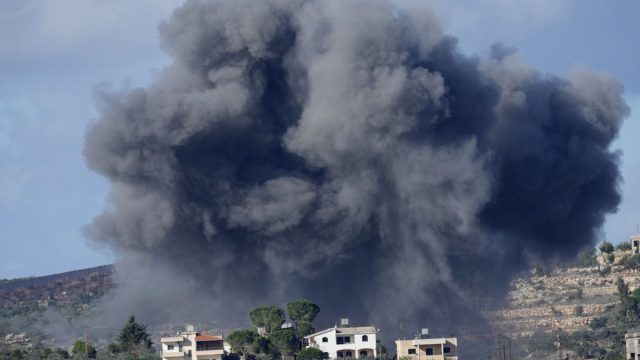The crossfire between Israel and Lebanon creates a serious risk of total war in the Middle East, says the UN Under-Secretary General for Peace Operations, Jean-Pierre Lacroix, in an interview with Euronews in Brussels.
Jean-Pierre Lacroix is especially concerned about the attacks on Israel from southern Lebanon – on the so-called Blue Line, demarcated by the UN – by the Hezbollah militia, supported by Iran, and the actions of the Tel Aviv Government in its northern neighbor, including Beirut, the capital.
The diplomat recently visited the region and spoke with ‘Euronews’ about the need for political de-escalationbefore attending the EU Council of Defense Ministers in Brussels on Friday.
“I pay special attention to the situation we have with our UNIFIL mission (UN peacekeeping mission in Lebanon) and the risk of escalation remains very serious. We talk about regional escalation because this situation in Gaza, and several other situations in the Middle East, are all very interconnected,” explained the senior French diplomat.
Middle East, after the conflict between Israel and Hamas
Since Israel began its military operation in Gaza Strip after a terrorist attack by the Palestinian armed group Hamas On October 7, 2023, several incidents have revealed the extension of the conflict to neighboring countries.
The most important one is Iranespecially for its support for militias, not only in Lebanon, but also in Yemen, Iraq and Syria. These militias have increased their attacks, which justify as retaliation for Israeli operations in the Gaza Strip and other Palestinian territories.
“We have seen episodes of retaliation that contribute to maintaining a high risk of regional escalation beyond what we are already seeing in Gaza. So obviously the ongoing efforts in the peace talks in Gaza are extremely important,” said Jean-Pierre Lacroix.
Risks of retaliation by Iran
After the current war in Gazaone of the most tense moments between Israel and Iran took place in the spring, when Israeli airstrikes on Damascusthe Syrian capital, killed Iranian officials who were meeting in a diplomatic building on April 1.
Two weeks later, Iran launched its first attack directly against Israeli territory, with a barrage of 300 missiles and dronesalmost all repelled by anti-aircraft defense systems (Tel Aviv had the help of US military assets in the region).
There have been other cases of civilian casualties, but the situation worsened when Ismail Haniyeh, senior Hamas political official, was killed in Tehran (Iranian capital) on July 31, where he had traveled to attend the inauguration of Iran’s new president, Masoud Pezeshkian.
He Israeli government He has not confirmed it, but neither has he denied his responsibility in the explosion that killed the leader in his hotel room, an operation allegedly carried out by the Israeli secret services.
AlThe next day, the United States reinforced its military deployment in the Middle East, as Iran vowed to retaliate against Israel. Almost a month later, the threat has yet to materialize, but the UN is concerned.
“Iran is obviously an important actor in the region, participating in different ways in the discussions that are taking place to try to achieve peace. After what happened in Tehran, there is speculation about a possible reaction from Iran, but I am not going to contribute to it,” said the deputy secretary general of the HIM.
What future awaits Gaza after the ceasefire?
Several members of the UN Security Council They talk about the possibility of creating a future mission to maintain the peace in Gaza. But Lacroix claims that “it’s premature”since it would require the agreement of the parties involved, directly and indirectly, in the conflict, and the unanimous vote of the five members of the UN Security Council (United States, Russia, China, France and the United Kingdom).
But there is another important condition for the diplomat: “Any presence of third parties -and this certainly applies to UN peacekeeping missions- must also be accepted by local communities. “They have to consider that the mission would make a positive difference in their lives.”
At the request of the EU and other powers, Israel just agreed to three pauses in Gaza fighting, starting next week, to allow for a polio vaccination campaign for some 640,000 children.
But negotiations for a long-term ceasefire agreement, proposed by the US and negotiated with the help of Qatar and Egypt, remain deadlocked.
What future for multilateralism?
United Nations will organize a Future Summit on September 22 and 23 at its headquarters in New York (USA), with the aim of building a consensus among the 193 countries to strengthen multilateralism and collective responses to the challenges of peace and security, disarmament, climate change and sustainable development.
“When it comes to peace missions, Member States should provide more political support in addition to sending soldiers. Peace missions do not have military objectives, but political ones, and must rely on other tools such as the fight against disinformation, cross-border criminal activities and climate change, which fuel more and more conflicts,” explained Jean-Pierre Lacroix.







